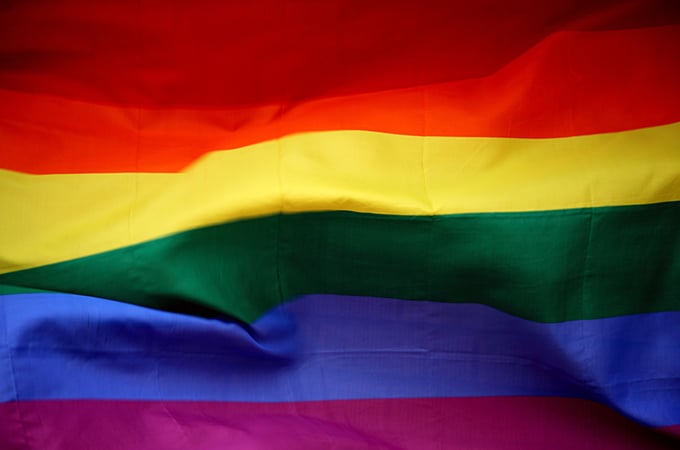The University of Redlands is launching a Certificate in LGBTQ Leadership next month, thanks to a collaboration between the School of Continuing Studies and the Applied Wisdom Institute of the Graduate School of Theology.
Katie Olson and Mika Elizabeth Ono of the Bulldog Blog sat down with Amy Moff Hudec, associate director of U of R Community Service Learning, and Michael Adee, director of the Partner for Global Faith and Justice Project, to talk about the certificate, its content, and how it will benefit those pursuing careers involving LGTBQ communities.
Bulldog Blog: How did the Certificate in LGBTQ [lesbian, gay, bisexual, transgender, or queer/questioning] Leadership come about?
Michael Adee: The new certificate will be offered through the Applied Wisdom Institute (AWI), which is designed to give people opportunities for continuous education that match their real-world and lived experiences. AWI programming, which includes the Certificate in Mental health and Spirituality, shows a commitment to social change, advancing equality and justice and helping people come together in their community.
I started working on this initiative in LGBTQ online education in 2018, before AWI became part of the U of R as part of the merger with the San Francisco Theological Seminary, because it filled a need. When people want to volunteer with an LGBTQ community organization, a transgender house or community organization, a gay–straight alliance at a school or if they’re on a school campus and simply want to be supportive of LGBTQ students and services, there is some core information they need to know. Other people, such as social workers, teachers, directors of queer studies programs, were interested in having a career in LGBTQ work.
Amy Moff Hudec: Although AWI originated as part of the seminary, it pulled away from some of the theology because a lot of people in the LGBTQ community have negative experiences with religion. This is the perfect time for a certificate like this because of the current conversation about gender identity, sexuality, and diversity and inclusion.
BB: What topics do students in the certificate program explore?
Adee: There are eight different sections: intersectional diversity; trans-affirming and non-binary gender identity and expression; creating safe spaces; community-based activism and social change; fundraising and nonprofit development; family acceptance; building bridges in religion and spirituality; and human rights and global advocacy.
BB: How long is the certificate, from start to finish?
Moff Hudec: Each of the eight courses runs for four weeks, so the program lasts eight months. It’s a significant commitment to do the whole thing. People also have the option of taking individual courses within the program.
BB: How might religious communities apply knowledge from the program?
Moff Hudec: A religious community ready to be more open and inclusive could have pastors or a couple members of their community enroll. I come from a religious studies background—I taught at the University of Redlands for a long time before I took the position I have now. I was moving in the direction of looking at religious traditions that were either tightening their boundaries around this topic and being more exclusive or loosening their boundaries and becoming more open and inclusive. That exploration is why I’m interested in working on this project.
BB: Is the course online?
Moff Hudec: Yes, the model is quite interesting. We have a facilitator and an adjunct facilitator for each course. Michael brings many great connections with people who are experts in the field, who have been identified as presenters for the course. They will help us create course content, such as videos around certain topics. For example, Denise Davis, a graduate of the University of Redlands and now mayor pro tem of Redlands, will be talking about her experiences establishing the Safe Space Alliance and how sexuality and sexual identity is political. Then, an adjunct professor will guide students through the content, engage in discussion, and give feedback.
BB: How are you planning to close the knowledge gap between people who might want to use this course as a starting point in their career and students who are just interested in learning more about these topics?
Moff Hudec: Just like any other course, there’s going to be a wide variety of backgrounds and baseline knowledge at the beginning. By the end of the program, students will be able to point to the certificate as evidence they put in the work and gained a broad base of knowledge, which could be potentially beneficial for a career path.
BB: When will classes for the certificate start and how do you sign up?
Moff Hudec: We are beginning with a pilot course, Intersectional Diversity: Facing Racism, Sexism, and Heteronormativity, on February 3. In this course, students will get to help identify best practices for this online social justice educational model. Then, the program will officially begin in April of 2020. If you’re interested in that pilot class or the certificate as a whole, a good place to start is our Certificate in LGBTQ Leadership web page. Or email me at amy_moffhudec@redlands.edu.






